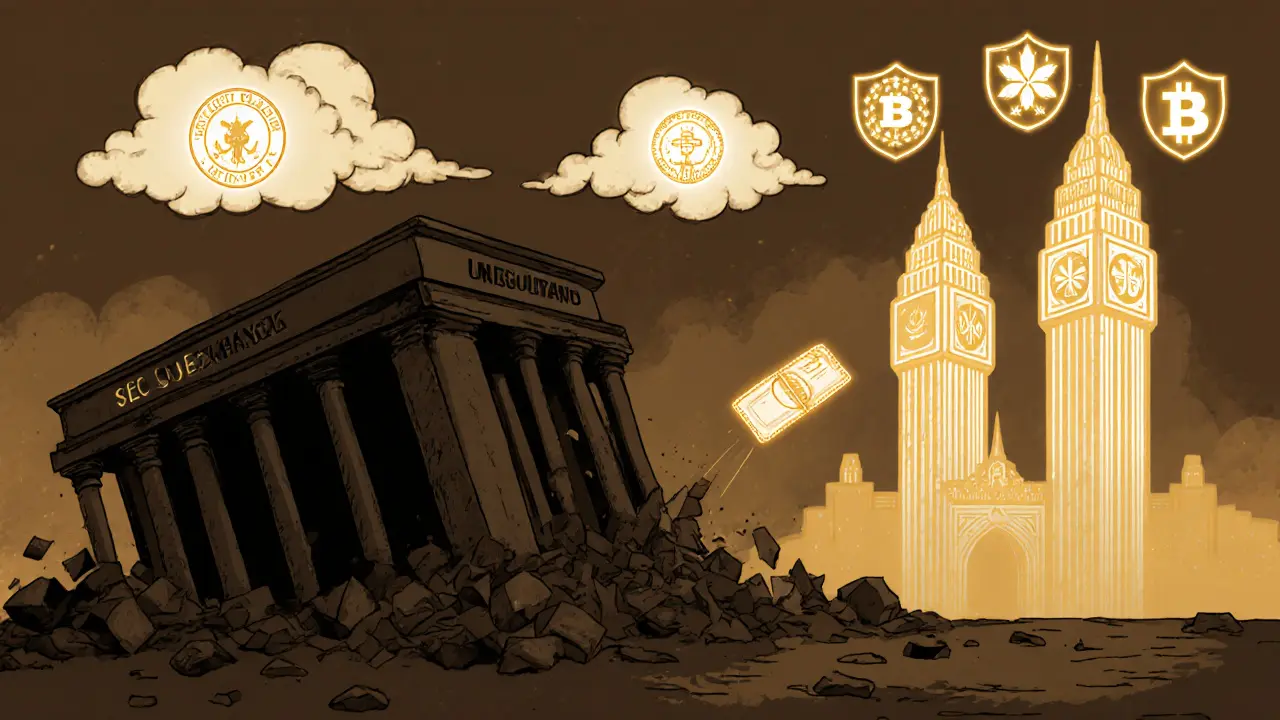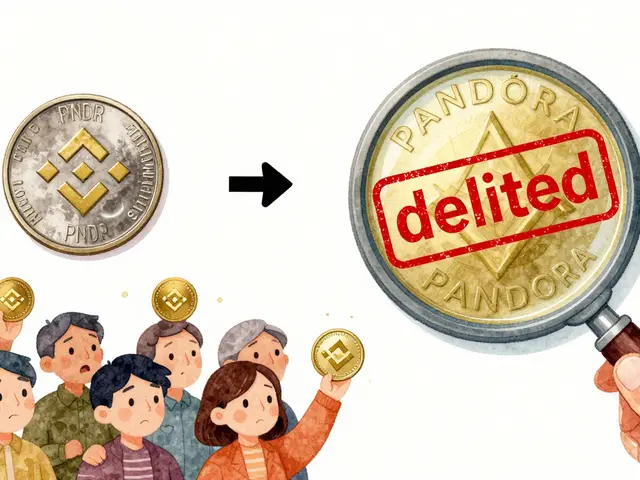
Crypto Regulation Checker
Check Your Crypto Regulation Compliance
See what regulations apply to you based on your location and crypto activity.
Key Requirements:
Resources:
Keeping up with crypto regulations isn’t just for lawyers or compliance officers anymore. If you’re holding Bitcoin, trading Ethereum, or even just curious about NFTs, you need to know what’s changing - and fast. In 2025, the rules around cryptocurrency are shifting faster than ever, and the consequences of ignoring them can be costly. A wallet you thought was safe could suddenly be flagged. A platform you use might vanish overnight. Or worse - you could unknowingly break the law in a country you never even visited.
Why Global Crypto Rules Are More Important Than Ever
Crypto doesn’t care about borders. You can buy Bitcoin in New Zealand, send it to someone in Nigeria, and cash out in Brazil - all in minutes. But governments? They still draw lines on maps. And those lines are changing constantly. In 2025, over 120 countries have some form of crypto regulation in place. But there’s no global rulebook. What’s legal in Singapore could be a felony in Iran. What’s allowed in the U.S. might be banned in the EU. That’s why staying informed isn’t optional - it’s survival.What’s New in the United States in 2025
The U.S. took a sharp turn in early 2025. After years of enforcement-heavy tactics - like the SEC suing Coinbase and Binance - the new administration shifted gears. On January 23, 2025, President Trump signed an executive order creating a task force to bring clarity to crypto rules. The message? No more guessing games. By February, the SEC dropped investigations into OpenSea and Robinhood. Coinbase’s legal troubles were dismissed. And on February 27, the SEC announced memecoins like Dogecoin and Shiba Inu would no longer be classified as securities. That was huge. For years, these tokens lived in legal limbo. Now, they’re treated like commodities, not investment contracts. But it’s not all smooth sailing. The Stablecoin Trust Act is moving through Congress. If passed, it would require stablecoin issuers to hold 100% reserves in cash or short-term Treasuries, with audits by the Federal Reserve and OCC. That means Tether and USDC would need to prove every dollar is backed - and publicly. The FIT Act is also gaining traction. It proposes splitting crypto oversight: the SEC handles tokens that act like stocks, the CFTC handles those that act like commodities. That’s a win for clarity. But until it becomes law, businesses still face a patchwork of state rules. Some states require money transmitter licenses. Others don’t. One wrong move could trigger fines or shutdowns.The EU’s MiCAR Rules Are in Full Force
The European Union’s Markets in Crypto-Assets Regulation (MiCAR) became fully enforceable in 2025. It’s the most comprehensive crypto law in the world - and it’s strict. Under MiCAR, every crypto exchange, wallet provider, and stablecoin issuer operating in the EU must get licensed. They need to publish white papers, prove they have enough capital, and protect users’ funds. Failure? Fines up to 5% of global revenue. The catch? Implementation isn’t instant. Some rules rolled out in January. Others in July. That means a company based in Germany might be fully compliant, while its sister company in Poland is still scrambling. This creates confusion for users and businesses alike. And while MiCAR brings structure, it also pushes some firms out. Smaller DeFi platforms and non-EU exchanges are finding it harder to serve EU customers. Some have simply blocked EU IP addresses.Asia Is Becoming the Crypto Regulatory Battleground
While the U.S. and EU debate, Asia is building its own rules - and attracting businesses. Hong Kong launched its new crypto licensing regime in March 2025. Now, any exchange offering spot trading, derivatives, or custody services must apply for a license. The rules are tough: cold storage requirements, anti-fraud controls, and mandatory audits. But the upside? Hong Kong is now one of the few places in the world where institutional investors can legally trade crypto with full regulatory backing. Singapore didn’t wait. It finalized its stablecoin framework in May 2025, requiring issuers to be headquartered locally and hold reserves in approved currencies. Unlike the U.S., Singapore doesn’t classify tokens as securities unless they promise profits. That’s made it a haven for DeFi startups. Meanwhile, Japan tightened its rules on leverage trading. South Korea introduced mandatory KYC for all crypto withdrawals. Even countries like Thailand and the Philippines are rolling out licensing systems. Asia isn’t banning crypto - it’s trying to own it.Global Watchdogs Are Getting Involved
You can’t regulate crypto with national laws alone. That’s why global bodies are stepping in. The Financial Action Task Force (FATF) updated its travel rule guidance in April 2025. Now, all crypto firms must collect and share sender and receiver data for transactions over $1,000. That includes peer-to-peer platforms and decentralized exchanges. Many DeFi protocols are struggling to comply - and some are shutting down in Europe and the U.S. to avoid liability. The Bank for International Settlements (BIS) released a report warning that unregulated stablecoins could trigger financial instability. That’s pushing central banks to accelerate their own digital currency projects. The ECB, Bank of England, and even the Reserve Bank of New Zealand are testing CBDCs - digital versions of their national currencies. The Basel Committee set new capital rules for banks holding crypto. If your bank offers crypto custody or trading, it must now hold more reserves against those assets. That’s making banks cautious - and some are pulling back from crypto services entirely.
What You Need to Do Right Now
You don’t need to become a lawyer. But you do need to stay alert. Here’s what to do:- Know your jurisdiction. Where are you based? Where are you trading from? Where is your exchange registered? Each matters.
- Track major updates. Bookmark the official websites of your country’s financial regulator. In the U.S., that’s the SEC and CFTC. In the EU, it’s ESMA. In Hong Kong, it’s the SFC.
- Use regulated platforms. If your exchange is licensed in the U.S., EU, or Hong Kong, it’s more likely to follow the rules. Unlicensed ones? They can vanish overnight.
- Keep records. Even if you’re just holding crypto, track your purchases, sales, and transfers. Tax authorities are catching up - and they’re asking for proof.
- Don’t ignore unhosted wallets. FinCEN’s new proposal in 2025 may require reporting transactions from wallets you control outside exchanges. That means if you move Bitcoin from Coinbase to your Ledger, you might need to report it.
The Big Picture: Regulation Isn’t Stopping Crypto - It’s Shaping It
Some people say regulation will kill crypto. That’s not true. It’s not stopping innovation - it’s sorting it out. The wild west days are over. But what’s replacing them is stronger, more sustainable infrastructure. Licensed exchanges. Transparent stablecoins. Clear tax rules. These aren’t bad things. They’re the foundation for crypto to go mainstream. The real risk isn’t regulation. It’s ignorance. If you don’t know the rules, you’re playing with fire. And in 2025, that fire can burn your assets, your access, or even your freedom.Where to Look for Updates
Here are the top 5 sources for reliable crypto regulation news:- SEC.gov - U.S. enforcement and policy changes
- esma.europa.eu - EU regulatory updates under MiCAR
- sfc.hk - Hong Kong’s crypto licensing portal
- fatf-gafi.org - Global anti-money laundering rules
- bis.org - Central bank and systemic risk reports
Do crypto regulations apply to me if I’m not a business?
Yes. Even if you’re just holding or trading crypto for personal use, you’re still subject to tax laws, reporting rules, and anti-money laundering requirements. For example, if you send $10,000 in Bitcoin to a friend in another country, that could trigger reporting obligations under FinCEN’s 2025 proposals. You don’t need to be a company to be affected.
What happens if I use an unregulated exchange?
You risk losing access to your funds, facing legal trouble, or being unable to cash out. Unregulated exchanges aren’t required to follow KYC, AML, or fund protection rules. If they get shut down or hacked, you have no recourse. In 2025, over 30 unlicensed platforms were forced offline in the U.S. and EU alone.
Are memecoins legal now in the U.S.?
Yes - as of February 2025, the SEC no longer considers memecoins like Dogecoin or Shiba Inu to be securities. That means they’re treated like commodities, similar to gold or oil. But that doesn’t mean they’re risk-free. They’re still volatile, and scams are common. Just because they’re legal doesn’t mean they’re safe.
Can I be fined for not reporting crypto transactions?
Absolutely. In the U.S., failing to report crypto gains on your tax return can trigger penalties up to 75% of the underpaid tax. In the EU, failing to disclose crypto holdings above €10,000 can lead to fines. Australia and Canada have similar rules. Many people don’t realize crypto is taxable - and they’re getting caught.
Will crypto regulations get simpler in the future?
Not anytime soon. Crypto is global. Governments are not. Until there’s a global treaty - which is unlikely - you’ll keep seeing different rules in different places. The best you can do is stay informed, use regulated services, and avoid crossing borders with crypto unless you know the rules on both ends.
14 Comments
Write a comment
More Articles

SheepDex Crypto Exchange Review: Is This Decentralized Exchange Worth Your Time?
SheepDex claims to be a decentralized exchange with spot and derivatives trading, but it has no trading volume, no audits, and no users. Don't waste your time or funds on this vaporware project.

PNDR and CoinMarketCap Airdrop: Separating Fact from Fiction
There's no official PNDR airdrop from CoinMarketCap. This article explains the confusion between PNDR and PANDORA tokens, current market status of PNDR, and how to avoid airdrop scams. Learn how to verify legitimate airdrops and protect your funds.

Alexis Rivera
November 3, 2025 AT 14:28Crypto regulation isn't about control-it's about maturity. The wild west had its charm, but you can't build a financial system on memes and luck. What we're seeing now is the painful, necessary transition from speculation to infrastructure. The SEC's shift isn't surrender; it's strategy. Clear rules mean institutional capital flows in. That's not the end of crypto-it's the beginning of its real potential.
People fear regulation because they confuse it with prohibition. But look at banking: we didn't eliminate banks, we regulated them. And now they're the backbone of global finance. Crypto can be the same-if we stop treating it like a rebellion and start treating it like a revolution.
The real winners? The users who stayed informed. Not the ones who hoped the rules would disappear. The ones who read the white papers, tracked the agencies, and adapted. That's not paranoia. That's responsibility.